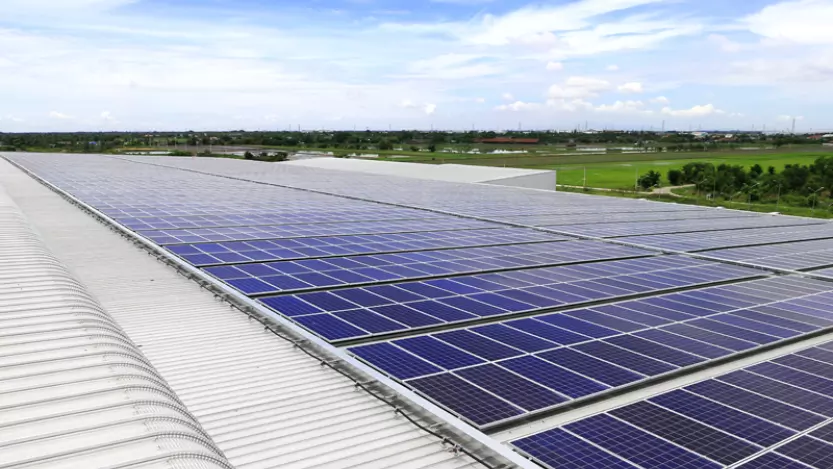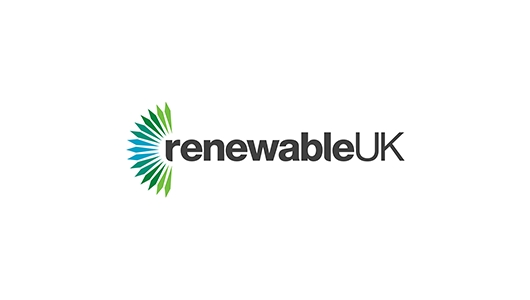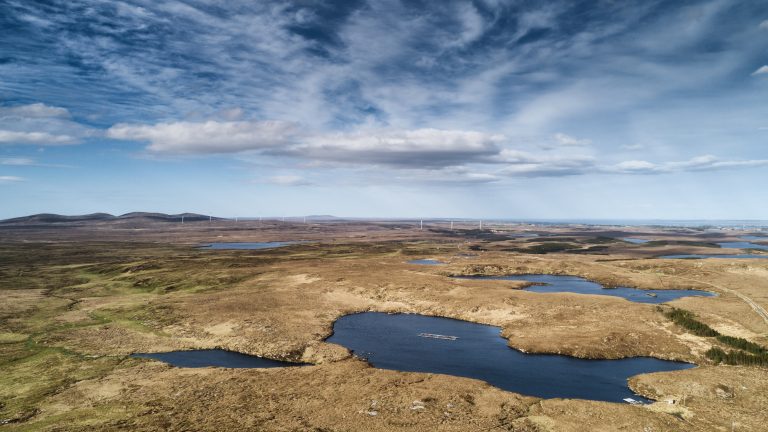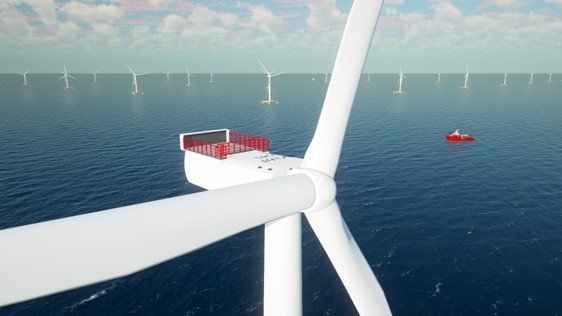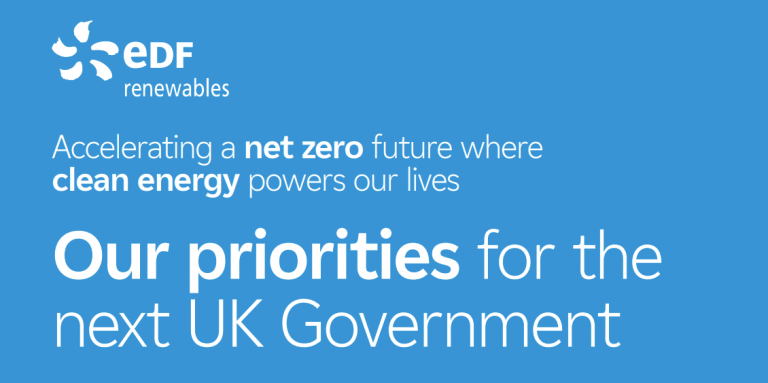
Day-to-day working life in renewables
Q. Where are you right now?
A. I’m in St Andrews, in Scotland. I’m usually based out of the London office. But my family are Scottish and when the first lockdown happened, I decided to leave my Westminster flat and return home for more space. I’ve ended up staying here for quite a while!
Q. What does your job as Principal Business Development Manager involve?
A. Essentially I’m responsible for the industrial and commercial (I&C) solar portfolio. These are solar projects for large clients, like Tesco. We’re looking for big energy users with good assets of some form – whether land or rooftop space – with whom we can rollout solar PV and help them generate their own zero-carbon electricity.
When we find a potential client, we carry out an early stage assessment of their on-site energy demand, and propose optimal solar PV systems. We work with the EDF Renewables teams to produce initial layouts and drawings, and predict the financial and carbon savings. We then pitch this early-stage evaluation to clients and, hopefully, win their projects.
Once we get the go-ahead, we take them through the de-risking process – carrying out structural surveys, detailed design work, putting in planning and grid applications etc – before handing over to the construction team to install the solar PV system.
Q. How quickly can I&C solar projects be rolled out?
A. It can be a pretty swift process, especially when you compare the timeline to other areas of renewables.
The biggest task is at the beginning: getting the client on board. But once they’re committed to the project, we can deliver the de-risking process (carrying out the surveys, getting permitted development agreed etc.) within as little as three months. Then the build for a site like Tesco can take six to ten weeks; so we’re only on client sites for a short period of time. Finally, there’s a handover and testing period, but this is usually wrapped up pretty quickly.
Q. What do you like about the role?
A. I like the client interactions – whether we’re presenting our proposals or building relationships. I’ve always liked the people side of things – it’s why I stayed in I&C rather than moving to work on the more sexy solar grid-scale projects!
Developments in the solar market
Q. Is I&C a growing area within the solar market?
A. There used to be government subsidies in place to encourage businesses to put solar on their rooftops. So we saw an increase in installations, predominantly because it was a really good investment. When the subsidies disappeared, about five years ago, the industry took a hit. However, it drove the market to improve efficiencies, and, now, we have seen costs reduce significantly. Clients can typically expect to see a 30% reduction on their delivered electricity unit price through an on-site generation Power Purchase Agreement (PPA).
The market’s now picking up as a result. This is also driven by the government’s targets to reach Net Zero, the UK hosting COP26 and the green recovery. It probably would have picked up more in 2020 if it hadn’t been for the Covid-19 pandemic.
What’s interesting about the I&C market this time round though, is that clients are more ambitious. The UK is the second biggest country in terms of the quantity of I&C clients that have signed up to RE100 – the global corporate renewable energy initiative, which commits members to 100% renewable electricity. So clients are talking publicly about what they’re doing now; and switching to renewable power is intrinsic to their operations – not simply a way to cut their energy bills.
Developing a career in the renewables industry
Q. How did you get into the industry?
A. I studied mechanical engineering at university, specialising in design and operations. After I graduated, I moved into engineering consultancy. It was a great first role, as I was working on loads of projects in different sectors: from aerospace and defence to renewables.
It was the renewables work that I enjoyed the most. I was working on large-scale biomass projects, some small-scale wind and some solar. I’ve always been interested in renewables. My parents live in the north of Scotland and have a wind turbine on site, along with ground source heat pumps and a few solar panels. So I’ve grown up believing in living sustainably.
It wasn’t long before I moved to a small start-up consultancy, specifically focused on renewables. I was their fourth employee and I was really excited about it! Essentially we did a lot of solar projects, as it was when tariffs were good. I really enjoyed the work, but it bothered me that projects weren’t being optimised for sustainability; they were purely finance deals to take advantage of the subsidies in place.
So after a few years I left, and I started my own company. We built integrated photovoltaic greenhouses and I really enjoyed it. The solar panels powered the temperature and lighting controls within the greenhouses for vertical farming. It was a good product, but we were a little too early for the UK market; so my business partner took it to the Middle East and I returned to engineering consultancy.
Again I worked on renewables projects, but this time I took on more of a client-facing role, rather than the day-to-day engineering work. I was there for about a year, before I saw my current role come up with EDF Renewables and, for me, this was a dream opportunity.
I’m quite entrepreneurial, and building up the I&C team for EDF Renewables from scratch felt a bit like running a start-up. However, this time I had the benefit of doing it within a huge global organisation. It ticked a lot of boxes for me and I was really excited to come in and help EDF Renewables grow the market.
Since I started, we’ve put a lot of new processes in place and optimised how we get bids out, increased our position competitively, and presented over 500 MW of solar opportunity to the I&C market. The solar team already existed at EDF Renewables, but the solar team was stretched across different projects, with the larger utility projects often winning the resource over the smaller scale I&C projects. Now we have clearly defined teams for utility solar and I&C helping us to focus on optimising our solutions for the specific sectors.
Diversity and inclusion within the renewables sector
Q. Do you think the industry could do more to promote diversity and inclusion?
A. This is the first job I’ve been in where the team is predominantly female! I’ve always managed men before and had male bosses. Not surprising given my career began in engineering and energy – both historically quite male-dominated sectors. So it’s really refreshing to see how inclusive EDF Renewables is.
Plus, renewables is a sector that’s quite forward-thinking and progressive anyway, which I believe helps drive diversity and inclusion. Anything we can do to drive greater diversity and inclusion across all industries will benefit successful growth and development in our ever-changing world.
Love what you do; do what you love
Q. What’s your favourite part of your job?
A. I really enjoy the client side – working with people; but I also love finding the optimal solution for a client. For instance: looking at how they use energy or how we can tweak the solar panels and the direction they face, to deliver them the absolute best solution. It’s really satisfying.
Q. And what’s your least favourite?
A. Probably the ‘paperless’ paperwork! But it’s a necessary part of the process.
Q. What’s a typical day like? (pre and post-Covid)
A. There isn’t really a typical day, because our projects come in waves. When we have a project that we’re trying to get through, for instance, we all work slightly longer hours. Last night, there were four of us still communicating at 9-10pm. But that’s unusual.
My normal day is more like 8.30am to 6pm, and we encourage people to take decent lunchbreaks and go for nice walks. It’s a friendly, nice working environment at EDF Renewables.
Q. Has your job been affected by Covid?
A. Yes – in the sense that a lot of our clients have been affected, which has had a knock-on effect for us. But one positive that’s come out of the pandemic is new, more frequent, interactions with our colleagues at EDF Renewables North America and the Paris team at EDF Renouvelables.
It used to be we had very little engagement with them – perhaps, meeting once a year. But through Microsoft Teams it’s become normal to call them up more regularly. And that’s been great, as we’ve collaborated on some pan-European bids together and are able to share clients globally.
Q. How is your role helping Britain and Ireland accelerate to a Net Zero future?
A. I’m part of the team working on the ground to roll out solar projects and encourage businesses to switch to renewable electricity.
The key thing we have to do, to accelerate the transition to Net Zero, is inspire the I&C industries. We need to spend time educating them about how it works having solar on site, and allay any fears they might have about the impact on their business. Because rolling out solar panels is a no-brainer. It won’t cost the business anything; it’ll reduce their energy bills; and provide them with zero-carbon electricity. Why would you say no?
Future developments in wind power
Q. What do you see for the future of the I&C solar market?
A. I see the market growing significantly over the years. Buildings over time need repair or rebuilding, and it’ll become the norm to install the optimum rooftop solar system to meet a business’ demand profile. Even if we reach the point where every I&C property has solar on their roof – which I hope we do achieve – buildings need repair, as do solar panels, albeit after 30 years! So then it’ll become more about ongoing operations and maintenance.
We’re also being much smarter nowadays, so we optimise the installations to ensure 100% of energy is used on site. There’s no point in having a bigger system if the extra energy isn’t going to be used. So it might be that we put a smaller solar system in now, but look to increase the size over time. This ensures a client’s system is future proofed, allowing the installation of batteries in the future, for instance, too.
Another trend I expect to see is businesses developing a portfolio of generation. If you were an investor, you wouldn’t put all your money in one pot. So why would you expect all your energy to come from one source of renewable technology?
We’re starting to have conversations with clients about buying a portfolio of energy, and that’s really exciting. Because at EDF Renewables this gives us a unique selling point – we can provide onsite, near-site and offsite wind and/or solar under various PPAs. We can also work with EDF to add nuclear into the mix. Or include additional technologies such as electric vehicle charging and storage. It’s about helping clients build up an energy portfolio – and how you then optimise that to help them achieve their sustainability targets.
Q. What would you say to a young person if they were interested in a career in renewables?
A. I love working in renewables. It’s exciting to work in an adapting and changing environment. Lots of people think of renewables as being a very technical industry – and that’s certainly my background. But there are loads of different routes into renewables. So I would 100% encourage it.


